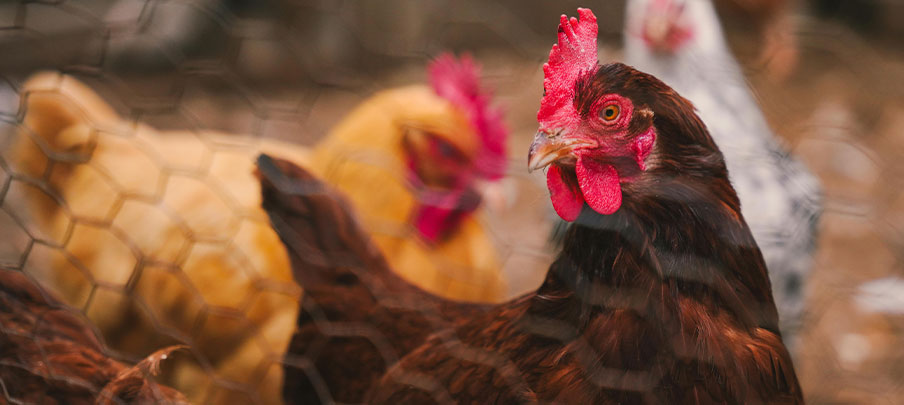
More than just a shelter, chicken coops are designed for bird welfare and productivity. These purpose-built structures provide a secure environment for chickens to roost, lay eggs, and find protection. Chicken coops are designed with nesting boxes, perches, and proper ventilation are all incorporated to ensure their comfort and health. From backyard hobbyists to large-scale farms, a well-designed coop is essential for a happy and productive flock.
Hardware cloth and chicken wire are both commonly used materials for constructing chicken coops, but they have distinct differences.
Tougher Materials: Hardware cloth is made of heavier gauge wires, typically made of galvanized steel or stainless steel. This makes it more durable and resistant to damage compared to chicken wire, which is made of thinner and softer galvanized or PVC-coated wire.
Smaller Openings: Hardware cloth has smaller openings, usually around 1/4 inch or 1/2 inch in size, which effectively prevents predators such as rats and snakes from entering the coop. In contrast, chicken wire has larger openings, typically about 1 inch, making it less effective in keeping out smaller predators.
Cost and Protection: Due to its tougher materials and smaller openings, hardware cloth tends to be more expensive than chicken wire. However, the higher cost is justified by the better protection it offers against predators that could harm the chickens.
Bend Resistance: Hardware cloth is stiffer and does not bend easily, maintaining its shape and structural integrity over time. On the other hand, chicken wire is more flexible and can be easily bent or manipulated, which may lead to gaps and vulnerabilities in the coop's security.
Injury Risk: Chicken wire has sharp edges and is more likely to cause injury to chickens if they come into contact with it. In contrast, hardware cloth has smoother edges and poses a lower risk of injury.
Hardware cloth serves as an effective means of predator-proofing for chicken coops and enclosures. It offers various methods to enhance security and protect the flock from potential threats.
Burying: A crucial aspect of predator-proofing involves burying hardware cloth along the perimeter of the coop. By digging a trench and burying the hardware cloth at least a foot deep, potential predators are deterred from burrowing under the enclosure, thereby keeping the chickens safe.
Cover Windows/Build Fences: Hardware cloth can be employed to cover windows and openings in the coop structure. By securely attaching hardware cloth over these vulnerable points, the risk of predators entering is significantly reduced. Additionally, constructing fences using hardware cloth creates a robust barrier that effectively keeps predatory animals out of the coop area.
Seal Small Openings or Gaps: To minimize the potential for predator intrusion, a thorough inspection of the coop is recommended. This inspection should identify any gaps, holes, cracks, or loose boards that could serve as potential entry points. Hardware cloth effectively seals these vulnerabilities and strengthens the coop's integrity.
Use to Cover Runs: Utilizing hardware cloth to cover outdoor runs or chicken yards provides an additional layer of protection against both aerial and ground-based threats. By securely fastening hardware cloth over the top of the run, chickens are shielded from potential attacks from above by airborne predators like hawks or owls. Simultaneously, the hardware cloth acts as a deterrent against ground-based predators attempting to breach the enclosure.
When purchasing hardware cloth for chicken coops, several important factors should be considered to ensure optimal performance and longevity.
Mesh Size: The mesh size refers to the spacing between the wires in the hardware cloth. It plays a vital role in predator protection by preventing entry from animals of various sizes. Smaller mesh sizes, such as 1/4 inch or 1/2 inch, offer better security as they effectively deter smaller predators like rats and snakes. However, it is important to strike a balance, as very small mesh sizes can restrict ventilation and make cleaning more challenging.
The Gauge of Wire: The gauge of wire used in hardware cloth determines its strength and durability. A lower gauge number indicates thicker and stronger wire. For chicken coops, it is recommended to choose hardware cloth with a higher gauge, such as 19 or 20, as it offers better resistance against bending or sagging. This ensures that the hardware cloth maintains its integrity and provides effective protection over time.
Rust Resistance: Chicken coops are exposed to various environmental conditions, including moisture and humidity. Therefore, selecting hardware cloth with rust-resistant properties is crucial for long-term durability. Look for hardware cloth that is galvanized or made from stainless steel, as these materials provide excellent resistance against corrosion and rust, extending the lifespan of the product.
Durability: The overall durability of the hardware cloth is a key consideration. It should be able to withstand the rigors of daily use and potential encounters with predators. Opt for hardware cloth that is known for its durability and resilience, ensuring that it can withstand external forces without compromising its effectiveness in protecting the chickens.
When it comes to safeguarding your beloved flock, investing in the right materials for your chicken coop is crucial. Hardware cloth stands as a reliable and durable solution, offering superior protection against potential predators and ensuring the safety of your chickens.
Here at CPME Industrial Sales Corp., we offer a variety of hardware cloth options suitable for chicken coop construction. Our selection caters to different needs, allowing you to find the right material for your specific coop design. By incorporating hardware cloth, you can contribute to a secure environment for your chickens. Contact us today to learn more about our products.